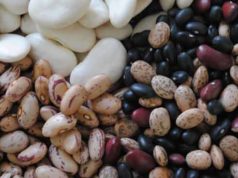Period bloating is natural occurring that women experience during a certain period of the month. Most ladies attest that it is one of most horrifying encounter in life. In this writing, find out how to get rid of menstrual bloating, remedies at home, how long it lasts, the causes, symptoms and a lot more.
Period Bloating Causes and Symptoms
Menstrual bloating is the stretching or swelling of the abdominal area during or before your menstrual cycle. The menstrual cycle, as is it known to many, is the regular natural change that occurs in the female reproductive system that makes pregnancy possible. Period bloating leads to fluid retention which is often accompanied by gas, causing the sufferer’s tummy to feel tight and uncomfortable.
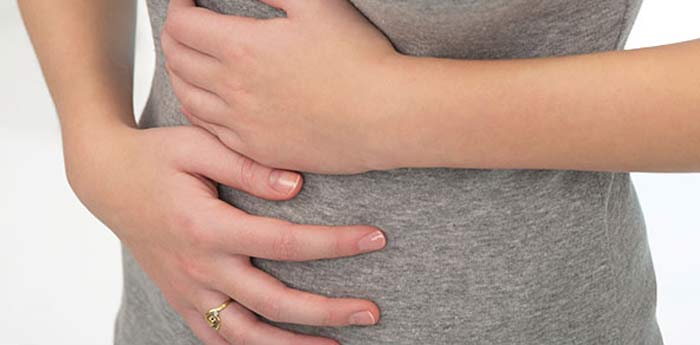
Causes menstrual bloating
Some of the causes of menstrual bloating include:
Hormonal fluctuations
During the menstrual cycle, your hormone levels change, especially estrogen and progesterone. About a week before your period, progesterone levels fall causing your kidneys that are responsible for passing out fluids to release less of the hormone in your urine. This will therefore affect the digestive system leading to bloating.
Hereditary factors
If your mother or grandmother suffered bloating and other premenstrual symptoms during their tender ages the probability is therefore high for you to experience the same symptoms of bloating before or during your menstruation cycle.
Dietary changes
Some dietary factors before your periods for example too much intake of salt in your food or diet or intake of a diet heavy in processed and preserved foods with sodium, and junk foods contributes to water retention.
You can also experience food cravings before your period. These food cravings can lead to an increased intake of sugar and salt can in turn worsen menstrual symptoms such as abdominal bloating and water retention.
Symptoms of Menstrual bloating
There are a number of symptoms which can be associated with period bloating and an individual can experience all or just one of these symptoms. They include:
- Increased belching
- Increased flatulence
- Swelling of the abdomen
- A feeling of fullness in the abdominal area
- A feeling of tightness near the stomach
- Constipation
How to get rid of Menstrual/Period Bloating
Changing your diet
Reduce salt intake
You should limit the amount of salt you take in your diet before your period which can help you prevent water retention this is because salt is high in sodium which is likely to cause fluid retention in your extracellular cells. You should also avoid processed and prepared foods and choose foods low in sodium this is because processed and prepared foods are high in sodium content.
Avoid starches, sugars and refined carbohydrates. When you have problems during your periods especially bloating you should avoid these foods because they make it difficult for your body to process estrogen. They also raise your blood glucose levels which encourage the retention of sodium leading to bloating.
Eat healthy food choices
Addition of fiber, fresh vegetables and fruits to your diet helps to balance your hormones. Thus, you should try to add extra servings of fruits or vegetables in every meal.
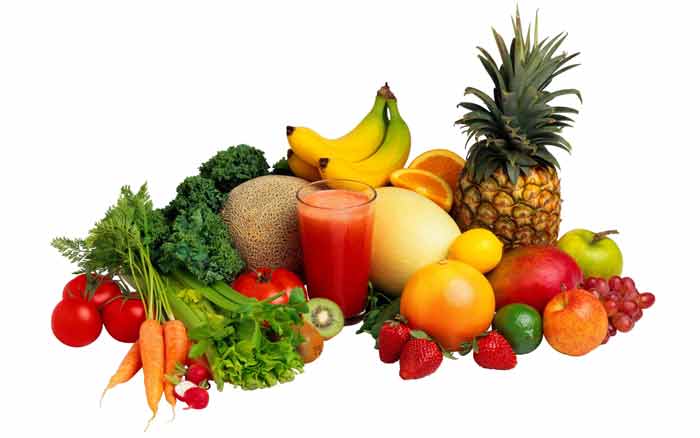
Check your portion
Eat small frequent meals throughout the day rather than the main meals. Eating 6 meals a day helps you to avoid that over-full feeling that frequently accompanies water bloating. This will also help in regulating your glucose levels which will as well help in reducing bloating.
Eliminate dairy products
Eliminating dairy products from your diet helps your hormones to remain balanced making you to feel healthier and reduces the effects of menstrual bloating. This is true especially in individuals who have undiagnosed lactose intolerance.
Take potassium rich foods.
Foods that are high in potassium such as bananas helps to reduce the amount of fluids your body retains. You can eat a plain banana every day, add slices of the fruit to your morning cereals or you can prepare a banana smoothie.
Avoid caffeine and alcohol intake
Excessive consumption of caffeine during your menstrual cycle can increase the swelling in your tummy and intestines. You should try to avoid coffee, chocolate and aerated beverages for a week before your periods.
According to some experts, alcohol can enhance PMS symptoms like bloating, mood swings, and breast tenderness.
Drinking more water
Period bloating can be reduced by drinking more water which can make you retain less water. Drinking additional water will encourage your body to release the amount of water that it is storing.
Changing your lifestyle
Get plenty of physical exercise.
When you choose to sit and being inactive encourages water bloating. You should maintain a daily exercise activity all the time is the best priority. It is important to focus on exercise while you are expecting premenstrual syndrome symptoms.
- Get 30 minutes of aerobic exercise every day.
- Try to walk outdoors, which will also help in reducing stress and increasing your vitamin D making you feel happier.
Lose your weight
Period symptoms and bloating are made worse when you are overweight. You should try to be within the normal weight range for your height which will help in reducing your menstrual bloating and also make you feel healthier.
Reduce stress
Stress can have long-term effects on your health. Having regular stress can put your body’s systems including your hormonal system in distress which can worsen all your period symptoms including bloating.
- You should try to use stress relieving techniques every day to help you prevent stress, such as deep breathing, meditation or yoga.
- Have enough sleep
Taking supplements or medications
Take calcium and magnesium supplements.
Your diet should provide at least 1,200 mg of magnesium daily but if it does not provide you should take a supplement. Calcium, magnesium and potassium can help in reducing effects of bloating.
Foods that are high in calcium include:
- Dairy products
- Kales
- Oranges
- Oatmeal
- Almonds
Foods that are high in magnesium include:
- Green leafy vegetables
- Pumpkin
- Sesame seeds
- Fortified cereals
Take an over-the-counter period relief pill.
Some period relief pills such as Pamprin or Midol helps your body to eliminate excess water because they contain a mild diuretic which helps in menstrual symptoms. They also contain anti-inflammatory medication which helps in other types of swelling.
Take a diuretic
An over-the-counter-diuretic medicine can help you to remove the excess water rather than retaining the fluids.
Try natural diuretics. Some food and drinks act as natural diuretics which may help to expel excess retained water, some also contain diuretic effects. Some of these foods include
- Coconut water
- Celery
- Cucumber
- Grape
- Green tea
- Dandelion
- Ginger
- Juniper
Take contraceptives
Oral contraceptives can reduce period symptoms. You should first consult your physician for a prescription that suits your body.
Other Period Bloating Remedies at Home
Drink peppermint tea
Peppermint has a natural pain relief and diuretic properties that can help in reducing bloating. Sitting and drinking a nice cup of tea can also help in relieving stress.
Apple cider vinegar
use up to 4 tablespoons of apple cider vinegar every day to bloat. Apple cider vinegar contains acetic acid which balances hydrochloric acid that your stomach makes.
You can also get bloat if you do not have enough hydrochloric acid to digest food. Apple cider vinegar will also help to digest food more easily and quickly. You can consider using organic apple cider vinegar because it’s the best choice.
Primrose oil
Primrose oil blocks the impact of prostaglandins that add bloat to your abdominal area. It comes in a tablet form and can be purchased at any health store. You should take eight tablets of it on a daily basis.
Heating pad
Use a heating pad to remedy both bloating and cramping.
Dealing with Extreme Bloating before Period
Extreme bloating occurs during the first stage which is the follicular stage. At this stage the estrogen levels increases as the uterine lining thicken and therefore bloating and water retention becomes more extreme and stronger as ovulation occurs in this stage.
What should you do if you have severe or extreme period bloating?
During excessive bloating you should try to limit sugar and salty snacks and deep fried foods like chips because these foods increases water retention which increases bloating and can worsen all of your premenstrual symptoms.
You should opt to consume healthy foods to decrease bloating by drinking plenty of clean fluids like water but not coffee or energy drinks. You should also focus on consuming lean proteins, fresh vegetables and fruits.
You can also take supplements.
A 2010 study published in the Iranian Journal of Nursing and Midwifery Research found that daily supplementation of 250 mg of magnesium plus 40 mg of vitamin B6 reduced self-reported premenstrual syndrome symptoms more significantly than magnesium alone or a pill with no active ingredients
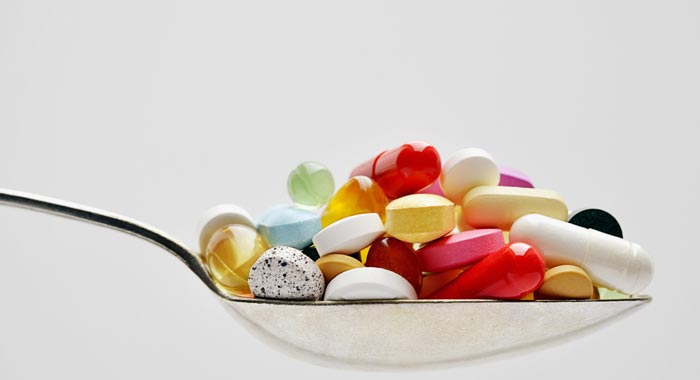
Still on supplementation, consider a multivitamin which includes vitamin B, vitamin C and iron.
How long does Period Bloating Last?
When does bloating go away after period? This may vary from one woman to another. Bloating can take place up to 14 days, that is two complete weeks, before your menstrual cycle starts and through the end of menstruation. In fact, even experts from Mayo Clinic say that this condition may go away after a duration of somewhere between 1 and 14 days.
Bloating during Menstruation Weight Gain
Gaining weight during period bloating is a common phenomenon. According to Natasha Johnson, M.D., a gynecologist at Brigham and women’s Hospital in Boston, you can gain up to five pounds or more during your period.
This comes about when the female sex hormone estrogen peaks during the second stage of your menstrual cycle right before your period.
High levels of the estrogen hormone can indirectly lead your body to retain fluid making you feel bloated which can potentially cause you to gain a few pounds of water weight. The estrogen levels will eventually drop as you start your period.
Another hormone which plays a role here is progesterone hormone. Progesterone levels spike in the second half of your cycle, which leads to water retention, enlargement of breasts and sometimes water gain, this is according to Johnson.
Food cravings and overeating can also cause bloating leading to weight gain. It is normal to have food cravings and overeating during this time of the menstrual cycle are due to hormonal changes and am increase in levels of metabolism.
These are perceived by the brain due to lack of glucose which leads you to consume around 100-200 extra calories, especially if you bleed heavily. Although these habits are temporary and they disappear with the end of your period.
Fall of magnesium levels. Before you start your period, your serum magnesium levels may drop. This will in turn decrease your insulin levels which increases sugar craving as your brain perceives a decrease in glucose levels. This will eventually increase sugar consumption which will lead to weight gain.
How to treat weight gain during period
Some of the ways of controlling weight gain during your periods include the following:
- Consult your doctor about the use of contraceptives to regulate your hormonal levels which will relieve menstrual symptoms including water retention and bloating.
- Dietary modification by limiting the intake of salty, sugary, processed foods, junk foods, caffeine and alcohol consumption because they cause water retention leading to weight gain. You should increase the intake of fresh vegetables and fruits and take 8-10 glasses of water daily.
- Encourage physical activity to keep you active during your periods to reduce premenstrual symptoms. Exercise also helps you to relieve stresss, prevents depression and suppresses your appetite.
Period Bloating before and after
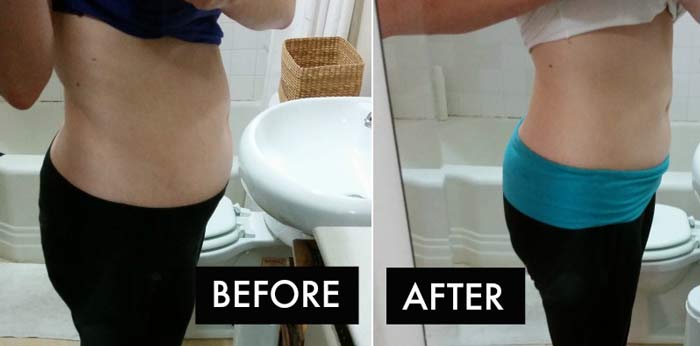
Sources
- https://www.ncbi.nlm.nih.gov/pmc/articles/PMC3748549/
- http://www.mayoclinic.org/healthy-lifestyle/womens-health/in-depth/water-retention/art-20044983
- https://www.34-menopause-symptoms.com/irregular-periods-and-bloating
- https://theperiodvitamin.com/bloating-during-periods
- http://m.md.health.com/weight-gain-during-period.html



